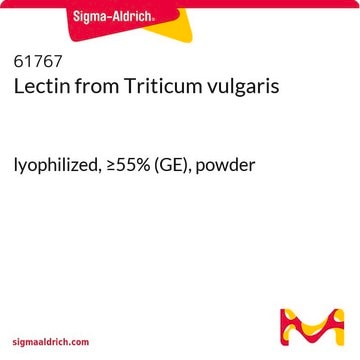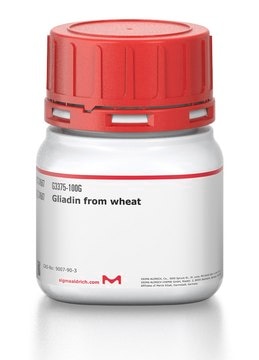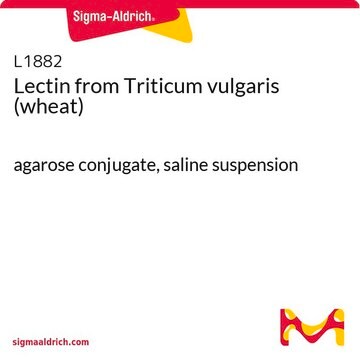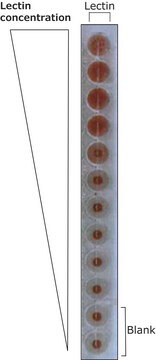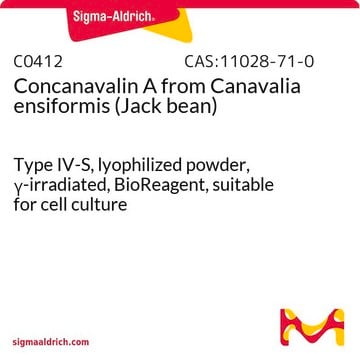L0636
Lectin from Triticum vulgaris (wheat)
suitable for cell culture, BioReagent, lyophilized powder
Synonym(s):
WGA, Wheat germ agglutinin
Sign Into View Organizational & Contract Pricing
All Photos(1)
About This Item
UNSPSC Code:
12352202
NACRES:
NA.32
Recommended Products
sterility
aseptically processed
Quality Level
product line
BioReagent
form
lyophilized powder
technique(s)
cell culture | mammalian: suitable
impurities
salt, essentially free
storage temp.
2-8°C
Looking for similar products? Visit Product Comparison Guide
General description
Lectin from Triticum vulgaris (wheat) is a dimeric glycoprotein of 36 kDa. It belongs to the family of chitin-binding proteins. Glycosylated precursor of lectin is synthesized in endoplasmic reticulum.
Application
Lectin from Triticum vulgaris (wheat) has been used:
- to conjugate with N-hydroxysuccinimide (NHS) dye
- to inhibit nuclear import
- to inhibit the nuclear pore of human cervical carcinoma HeLa and SiHa cells
Biochem/physiol Actions
Lectin from Triticum vulgaris (wheat) possessing four binding sites is specific for N-acetyl-d-glucosamine and N-acetyl-d-neuraminic acid (sialic acid) residues. Lectins also function as a fungicide. They also possess anti-nutritive effects.
WGA is not blood group specific but has an affinity for N-acetyl-β-D-glucosaminyl residues and N-acetyl-β-D-glucosamine oligomers. WGA contains no protein-bound carbohydrate.
Other Notes
Highly purified
Preparation Note
Conjugates are prepared from affinity purified lectin.
Storage Class Code
11 - Combustible Solids
WGK
WGK 3
Flash Point(F)
Not applicable
Flash Point(C)
Not applicable
Personal Protective Equipment
dust mask type N95 (US), Eyeshields, Gloves
Certificates of Analysis (COA)
Search for Certificates of Analysis (COA) by entering the products Lot/Batch Number. Lot and Batch Numbers can be found on a product’s label following the words ‘Lot’ or ‘Batch’.
Already Own This Product?
Find documentation for the products that you have recently purchased in the Document Library.
Customers Also Viewed
Super-multiplex vibrational imaging
Wei L, et al.
Nature, 544, 465-465 (2017)
Nuclear localization of Tob is important for regulation of its antiproliferative activity
Kawamura-Tsuzuku J, et al.
Oncogene, 23, 6630-6630 (2004)
Tsung-Lin Tsai et al.
International journal of nanomedicine, 7, 5215-5234 (2012-10-17)
Gold nanoparticles modified with the nuclear localization signal from simian virus 40 large T antigen (GNP-PEG/SV40) accumulate on the cytoplasmic side of the nuclear membrane in HeLa cells. Accumulation of GNP-PEG/SV40 around the nucleus blocks nucleocytoplasmic transport and prevents RNA
Effects of wheat germ agglutinin on human gastrointestinal epithelium: insights from an experimental model of immune/epithelial cell interaction
Dalla P, et al.
Toxicology and Applied Pharmacology, 237, 146-153 (2009)
Pengfei Zhang et al.
Chemical science, 13(43), 12760-12768 (2022-12-16)
Exosome analysis is a promising tool for clinical and biological research applications. However, detection and biomarker quantification of exosomes is technically challenging because they are small and highly heterogeneous. Here, we report an optical approach for imaging exosomes and quantifying
Our team of scientists has experience in all areas of research including Life Science, Material Science, Chemical Synthesis, Chromatography, Analytical and many others.
Contact Technical Service



